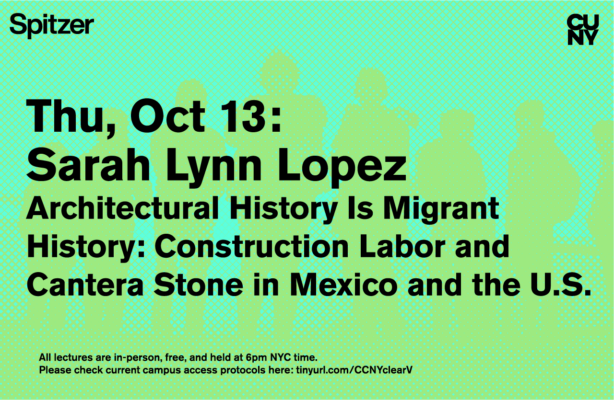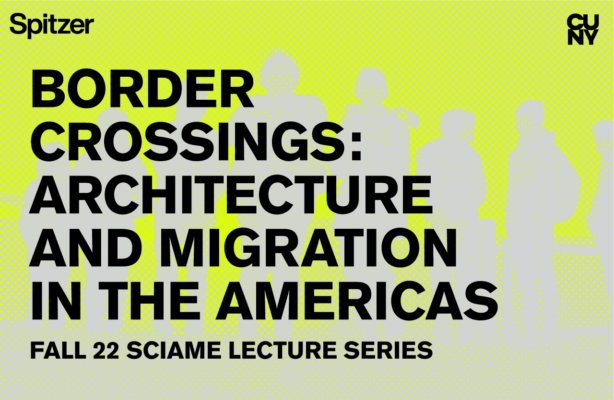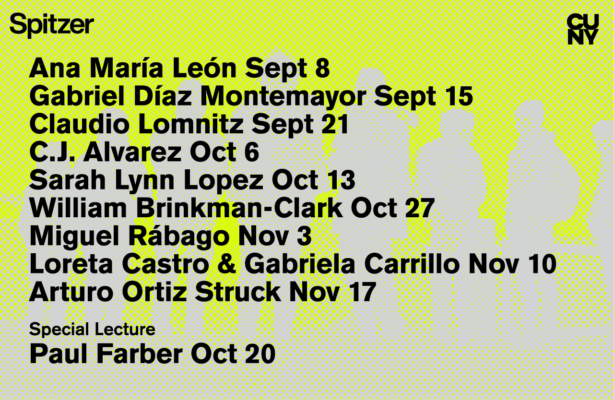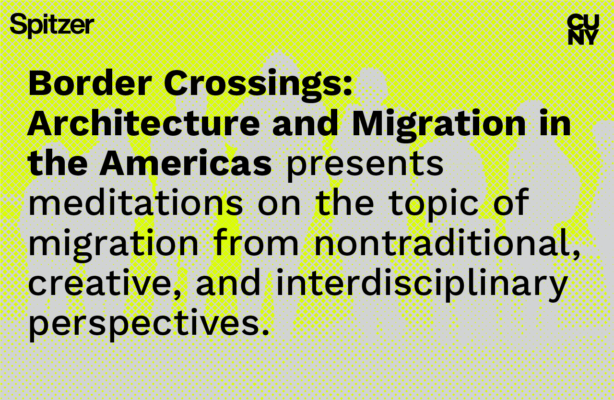Events
Fall 2022 Sciame Lecture Series: Sarah Lynn Lopez
Architectural History is Migrant History: Construction Labor and Cantera Stone in Mexico and the US
Thursday, Oct 13, 2022
6:00 pm - 7:30 pm
Sciame Auditorium (Room 107)
141 Convent Avenue
New York, NY 10031
Zoom option available
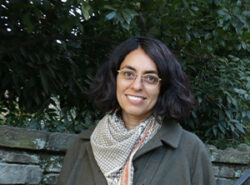
This lecture is held in-person and is part of the Fall 2022 Sciame Lecture Series, titled "Border Crossings: Architecture and Migration in the Americas."
Sarah Lopez, a built environment historian and migration scholar, is an associate professor at the Stuart Weitzman School of Design at the University of Pennsylvania. Lopez's first book, The Remittance Landscape: The Spaces of Migration in Rural Mexico and Urban USA, examines the impact of migrant remittances on the landscapes of Mexico. Her current projects include a history of migrant detention facilities in the U.S. and a history of construction labor and cantera stone in Mexico and the U.S. She researches at the intersections of migration, ordinary landscapes, urbanism, and spatial justice.
Professor Laura Wainer will introduce the speaker.
Suggested Reading: Ties That Bind: Migrant Placemaking at the U.S.-Mexico Boundary and Beyond
"Architectural History Is Migrant History" tracks the development over the last fifty years of a binational construction industry that has emerged around the excavation (in Mexico), transportation, distribution, and installation (in the U.S.) of cantera stone. Cantera literally means “quarry,” but the Spanish word is used in Mexico to describe a specific brittle rock used to build colonial churches and civic infrastructure. More recently, a network of Mexican quarrymen, stonemasons, homebuilders, architects, and businessmen have refined a cantera market that caters to a Mexican and Mexican American clientele in the American Southwest. "Architectural History Is Migrant History" recasts Mexican construction-related labor by tracking the development of a meaningful and sophisticated industry that has reshaped design norms and building trades in two countries from the shadows of a formal American economy.
"Border Crossings: Architecture and Migration" in the Americas presents meditations on the topic of migration from nontraditional, creative, and interdisciplinary perspectives. The distinguished speakers -- architects, landscape architects, architecture historians, social historians, a philosopher, an anthropologist, and an attorney -- question conventions, especially the conceptualization of migration as linear. They frame migration as a multivalent process, considering the lived realities and material conditions of migration, historically and in the present. Migration in the Americas is more than just the movement and resettlement of bodies, numbers that cross lines and appear/disappear in different places. Migration is not merely (dis)placement, it is also a metamorphosis. Migrants are human beings who are transformed to the core by their movement, and they transform not only their places of departure and arrival, but the entire space that is filled with their journeys.
"Border Crossings: Architecture and Migration" in the Americas presents meditations on the topic of migration from nontraditional, creative, and interdisciplinary perspectives. The distinguished speakers -- architects, landscape architects, architecture historians, social historians, a philosopher, an anthropologist, and an attorney -- question conventions, especially the conceptualization of migration as linear. They frame migration as a multivalent process, considering the lived realities and material conditions of migration, historically and in the present. Migration in the Americas is more than just the movement and resettlement of bodies, numbers that cross lines and appear/disappear in different places. Migration is not merely (dis)placement, it is also a metamorphosis. Migrants are human beings who are transformed to the core by their movement, and they transform not only their places of departure and arrival, but the entire space that is filled with their journeys.
All lectures are free, open to the public, and held in the Bernard and Anne Spitzer School of Architecture Sciame Auditorium with remote option available. See https://www.ccny.cuny.edu/return-campus for current requirements for in-person visitors.
For remote viewing via Zoom, please register here.
This lecture series is made possible by the Spitzer Architecture Fund and the generous support of Frank Sciame ’74, CEO of Sciame Construction.
Export as:


